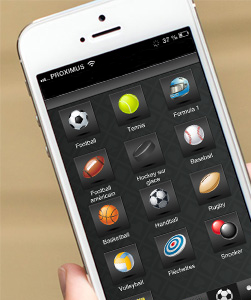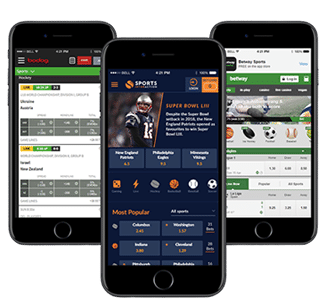Sports Mobile Betting
South Dakota residents approved sports betting in Deadwood by referendum last November.
Sports Crib Mobile
What they also approved was language that created a mobile loophole.
1 day ago New York Governor Andrew Cuomo has proposed a competitive bidding process for mobile sports betting. While that may increase the potential economic upside for the state, will it exact an. Jan 06, 2021 Cuomo had previously contended that the legalization of online sports betting would require a constitutional amendment and remained opposed to mobile wagering for much of 2020, a position that. Jan 06, 2021 Cuomo's proposal would be to allow the state Lottery Division to develop and operate a mobile sports betting system. Casinos would have a partnership with the state through a new state operator.
Whether bets are technically placed on a device or on a server remains an unanswered legal question in federal law. SD bets legally have to be placed at a Deadwood casino, but that can be established by keeping the mobile betting servers at the casino.
Mobile sports betting gives you access to SportsBetting.ag mobile betting platform right from your iPhone, iPad or Android smartphone. Simply go to mobile.SportsBetting.ag and enjoy access to a range of new features, including instant access to betting lines and wagering slips and much, much more.
SB 44 introduced by the Committee on Commerce and Energy suggests exactly that:
Any sports wagering may only be conducted in the interior of a licensed gaming establishment within the city of Deadwood. Each operator or route operator that is authorized by the commission to conduct sports wagering shall install and maintain equipment that is approved by the commission to ensure that all bets are placed from within the interior of a licensed gaming establishment within the city of Deadwood.
It’s also important to note that the distinction “within the city of Deadwood” does not apply to the state’s 11 tribal casinos. Under federal law, Indian casinos can offer any games authorized by that state’s legislature on tribal land.

Unfortunately, legal SD sports betting could struggle to capture dollars flowing to the illegal market or nearby Iowa should this bill pass as written.
Market-killing South Dakota sports betting bill detail
While it’s a big plus to include mobile betting in the bill, there’s one flaw preventing a truly open market.
The legislation requires in-person registration in Deadwood, which sits on the western border of the state. That’s a problem for those throughout the massive state that want to legally take part in online sports betting.
Take a sports bettor in Sioux Falls – a 5.5-hour car trip from Deadwood – for instance. That bettor would likely continue to bet in Iowa, which is only a 20-minute ride.
Iowa just became easier too
In-person registration recently expired in Iowa. That means anyone can bet with any sportsbook in the state with just a quick trip over the border.
Other important details:
- It will only cost $2,000 annually for a sports betting license.
- No betting on South Dakota college events.
- No prop bets that focus on an individual college athlete’s performance.

In-person registration could change after passage
While there’s no expiration date for in-person registration like in the Iowa or Illinois sports betting markets, South Dakota could change its mind down the road.
Rhode Islanddid just that last summer. Originally, the RI sports betting legislation interpreted state law to mean customers must sign up in-person.
A later review indicated the servers being at the casino was enough to satisfy the law. Since the change in July, revenue and handle increased every month year-over-year through November.
Professional sporting event definition could cause confusion
One notable area of the bill is the definition for a professional sporting event:
“Professional sporting event,” a sporting event, other than a minor league sporting event, in which two or more persons participate and receive remuneration in excess of their out-of-pocket expenses for participating in the event;
This type of language has caused issues in the past. Some PGA Tour events were not available to bet in Illinois because of similar language.

The NY sports betting proposal some legislators appear to favor over Gov. Andrew Cuomo‘s state-run model is getting support in both chambers.
The New York Senate voted S 1183 out of committee on Tuesday. The Assembly followed suit, voting A 1257 out of committee on Wednesday.
Caesars Mobile Sports Betting
Multiple members of the assembly voiced enthusiastic support for the legislation and sponsor Assemblyman Gary Pretlow. The bill offers a much different model than Cuomo’s plan for a state-run format that his office claims would lead to more revenue.
One or more operators would be selected through an RFP to offer sports betting in New York in Cuomo’s proposal.
“I just want to say congratulations, Gary,” said Assemblywoman Aileen Gunther. “You’ve worked so long on this and I tell you, I think this is the time to pass this.”
Details of NY sports betting bill
The legislative proposal, primarily sponsored by Pretlow and Sen. Joe Addabbo Jr., has these features:
- The bill allows the state’s four full commercial casinos and three tribal operators to partner with two mobile sportsbooks each. That would mean up to 14 sports betting operators in New York even before the future downstate casinos are considered.
- Each online sportsbook operator would have to pay a one-time $12 million fee. That could equal $168 million in state revenue before anyone takes a bet if all 14 licenses are used. The upfront cash could help sway legislators to a yes vote.
- Professional sports stadiums and off-track betting facilities can partner with a casino to host betting kiosks.
- Sports betting revenue would be taxed at 8.5% for retail bets and 12% for online bets. Five percent of those tax revenues will go toward problem gambling programs – more on that in the negatives section, unfortunately.
- Online registration is allowed.

Should the proposal become law, Pretlow doesn’t intend to let the gaming commission drag its feet as it did with retail sports betting.
“I believe that this is so popular that they will be pressured by numerous individuals across the state to rush the regulations,” Pretlow said. “Because they could start writing regulations right now if they wanted to.
“So I’m pretty sure that we’re going to pressure them into doing something a lot quicker than they did with the sports betting that took over a year to put into place.”
Pretlow expects how much handle?
One assemblyman brought up New Jersey‘s sports betting success, which sent Pretlow off on a tangent:
“Thirty percent of the numbers that Jersey’s putting up are New York numbers,” Pretlow said. “That’s by their own admission so it more than likely is more. New York state is two and a half times the size of New Jersey so we’re going to at least double.
“Right now, in the last month they’re doing a billion dollars of handle a month. A billion dollars, $12 billion a year. We’re going to do at least twice that. So we do $2 billion a month or $2.5 billion a month, I think that all of our expectations will be met.”
Pretlow was correct to say NJ sports betting brought in $1 billion in handle last month, but the $12 billion a year mark is inaccurate. New Jersey finished 2020 with $6 billion in handle.
It’s also awfully bullish to expect $2 billion to $2.5 billion to be bet every single month, especially at launch.
Handle is a bit higher than Cuomo’s expectations
Pretlow’s assumed market size is a bit bigger than what the governor expects out of his monopoly model. Cuomo expects $500 million in revenue annually from his state-run model compared to $50 million from an open model. Based on traditional 5% hold, Cuomo’s model assumes $20 billion in annual handle.
That $500 million would take time of course. The fiscal 2022 budget suggests $49 million in revenue with a quick ramp-up to $357 million in fiscal 2023, $465 million in fiscal 2024 and $493 million in fiscal 2025.
While there is no fiscal note for Pretlow’s bill, we can get close to the likely estimates. With 5% hold and 90% of bets coming online, the $24 billion to $30 billion in handle Pretlow expects would generate $1.2 billion to $1.5 billion in operator revenue.
That would suggest between $139.8 million and $174.8 million in annual tax revenue under Pretlow’s plan. That’s certainly better than $50 million annually but might not be close enough to Cuomo’s pipe dream for him to support the proposal.
Leagues should be thrilled with NY sports betting bill
There are a few hiccups in the bill, including a double-dip for sports leagues.
Along with requiring official league data for live betting, operators also must pay 0.2% of the handle wagered on a specific sport to that sport’s governing body as an integrity fee for the leagues.
Pretlow, who has long called for an integrity fee, echoed the reasoning the leagues have tried to pass off on legislators since PASPA ended.
“There is a small piece we take from the bookie and give to the leagues and the overseers of the sports, like the NFL, the PGA,” Pretlow said. “That money is used for them to enhance their watching of the player activity.”
Elsewhere in NY sports betting bill

There are a couple of other potential knocks against Pretlow and Addabbo’s proposal.
The bill takes a somewtha cold stance toward problem gambling for anyone 30 or older. Problem gambling programs crafted by the NY State Gaming Commission will craft programs to “address problem gaming by users under the age of thirty.”
The annual report on problem gambling will also include “an assessment of problem gaming among persons under the age of thirty.”
There’s also no mention of expediting the unused three downstate casino licenses. The four upstate casinos received a head start that is supposed to end in 2023 but there have been attempts to move that date up.
Those licenses could go for $500 million apiece to help the state address immediate budget issues, as well as add six more mobile sportsbook licenses.
Cuomo’s budget includes a request for information from any companies interested in those licenses.